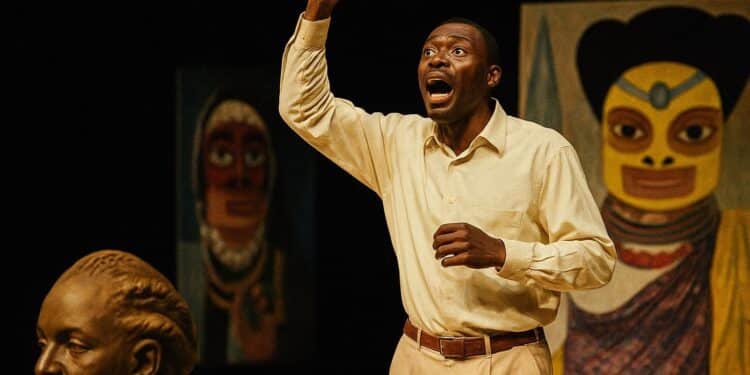Burg Welcomes a Voice From Brazzaville
When the medieval masonry of Burg’s Hauptstrasse bathes in July’s early twilight, it will echo with an idiom rooted far from the Elbe. From 18 to 20 July, Congolese author, dramaturge and director Dieudonné Niangouna assumes the honorary role of patron at the eighth Festival Induction, curating—yet also challenging—the European stage with his latest creation, “Opération Rumba”. The invitation, confirmed by the festival’s artistic director Annika Schuster in late May, aligns with Germany’s renewed curiosity for African contemporary arts, a trend underscored by last year’s Memorandum of Understanding between Berlin’s Foreign Office and the African Union on cultural exchange.
A Polyphonic French, Seasoned With Lari
Niangouna’s dramaturgical signature resists linear taxonomy. His French oscillates between academy and argot, punctuated by shards of his mother tongue, Lari, in a deliberate pursuit of what he calls “une langue des vivants pour les vivants.” This lexical alchemy, reminiscent of compatriot Sony Labou Tansi, has been maturing since the author’s early texts such as “Nouvelle Terre Were Were Liking” and “Intérieur et Extérieur.” In Burg, spectators will hear a French that is at once classical, streetwise and unabashedly poetic, calibrated for European ears yet unapologetically Brazzaville in cadence.
Tracing Rumba’s Atlantic Gyre
The dramaturgy of “Opération Rumba” is neither mere musical homage nor nostalgic tableau. Niangouna interrogates rumba’s Atlantic itinerary: from Kikongo rhythms that survived the Middle Passage, to their syncretic rebirth in Cuban son, and their triumphant homecoming to Léopoldville and Brazzaville in the 1940s. By revisiting that loop—what Aimé Césaire once branded a “return to the native land”—the piece foregrounds a history in which colonisation could never fully silence indigenous improvisation. The play quietly echoes UNESCO’s 2021 inscription of Congolese rumba on the Representative List of the Intangible Cultural Heritage of Humanity (UNESCO 2021), a diplomatic milestone jointly championed by the Republic of Congo and the Democratic Republic of Congo.
Soft Power in Twelve-Bar Measures
Officials in Brazzaville, including Culture and Arts Minister Lydie Pongault, have repeatedly emphasised the strategic value of the UNESCO listing as an instrument of cultural diplomacy. By lending state support to artists like Niangouna—whose work is celebrated abroad—the administration signals its intent to project a narrative of resilience and creativity beyond oil indexes or security headlines. In Burg, that strategy materialises through the simple fact that a Congolese playwright curates an entire German festival evening, not as an invited curiosity but as an intellectual equal engaging Europe in polylogue.
A Stage Dialogue Beyond Borders
Niangouna’s own commentary, shared during a Radio France Internationale interview in March, underscores an ethos of communal catharsis: “Je fais du théâtre pour cacher dans le dos des acteurs ce rire intelligent que notre siècle tente d’étouffer.” His statement gains resonance in a region where, as academic observers from the University of Kinshasa point out, rumba historically functioned as a civic forum during the struggles for independence. By re-animating that forum on a German stage, “Opération Rumba” illustrates how cultural artefacts migrate, adapt and ultimately invite diplomatic conversation where conventional protocols sometimes falter.
Economic Resonances and Market Footprints
Beyond symbolism, the production hints at tangible economic dividends. According to the Franco-Congolese Cultural Centre, Brazzaville’s creative industries accounted for an estimated 3.4 percent of national GDP in 2023, a figure the government aims to expand through export-oriented cultural goods. European tours generate royalties, touring fees and downstream collaborations that funnel expertise back home. Festival Induction, partially financed by Germany’s Federal Foreign Office, offers co-production grants that Niangouna’s company Les Bruits de la Rue intends to reinvest in training workshops for emerging Congolese playwrights later this year.
Toward a Shared Aesthetic Citizenship
Ultimately, “Opération Rumba” invites audiences to conceive culture as a movable commons rather than a fixed patrimony. Its dramaturgy refuses to lament colonial rupture; instead, it stages rumba as evidence of an enduring dialogue that preceded, survived and now re-shapes the post-colonial horizon. For Congo-Brazzaville, such artistic exports cultivate an image of a nation confident enough to revisit its history without grievance and generous enough to share its rhythms without gatekeeping. In a world where soft power is increasingly measured in decibels and syllables, Niangouna’s Burg engagement offers a reminder that diplomatic capital can indeed be accrued in twelve-bar measures.











































